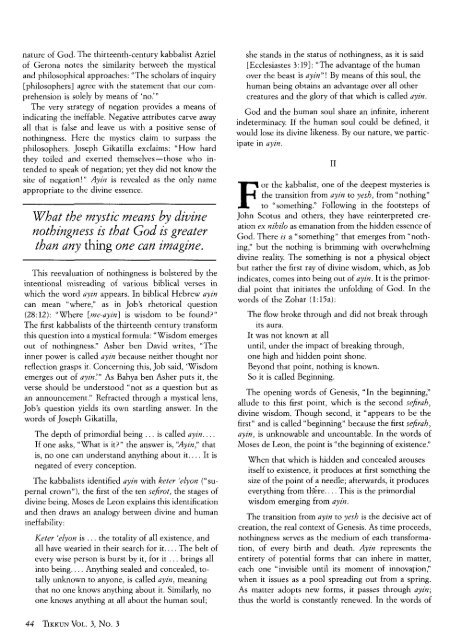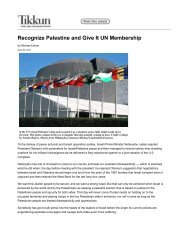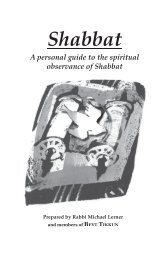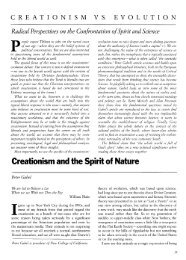Ayin:The Concept of Nothingness in Jewish Mysticism
Ayin:The Concept of Nothingness in Jewish Mysticism
Ayin:The Concept of Nothingness in Jewish Mysticism
You also want an ePaper? Increase the reach of your titles
YUMPU automatically turns print PDFs into web optimized ePapers that Google loves.
nature <strong>of</strong> God. <strong>The</strong> thirteenth-century kabbalist Azriel<br />
<strong>of</strong> Gerona notes the similarity between the mystical<br />
and philosophical approaches: "<strong>The</strong> scholars <strong>of</strong> <strong>in</strong>quiry<br />
[philosophers] agree with the statement that our comprehension<br />
is solely by means <strong>of</strong> 'no.'"<br />
<strong>The</strong> very strategy <strong>of</strong> negation provides a means <strong>of</strong><br />
<strong>in</strong>dicat<strong>in</strong>g the <strong>in</strong>effable. Negative attributes carve away<br />
all that is false and leave us with a positive sense <strong>of</strong><br />
noth<strong>in</strong>gness. Here the mystics claim to surpass the<br />
philosophers. Joseph Gikatilla exclaims: "How hard<br />
they toiled and exerted themselves-those who <strong>in</strong>tended<br />
to speak <strong>of</strong> negation; yet they did not know the<br />
site <strong>of</strong> negation!" <strong>Ay<strong>in</strong></strong> is revealed as the only name<br />
appropriate to the div<strong>in</strong>e essence.<br />
What the mystic means by div<strong>in</strong>e<br />
noth<strong>in</strong>gness is that God is greater<br />
than any th<strong>in</strong>g one can imag<strong>in</strong>e.<br />
This reevaluation <strong>of</strong> noth<strong>in</strong>gness is bolstered by the<br />
<strong>in</strong>tentional misread<strong>in</strong>g <strong>of</strong> various biblical verses <strong>in</strong><br />
which the word ay<strong>in</strong> appears. In biblical Hebrew ay<strong>in</strong><br />
can mean "where," as <strong>in</strong> Job's rhetorical question<br />
(28:12): "Where [me-ay<strong>in</strong>] is wisdom to be found?"<br />
<strong>The</strong> first kabbalists <strong>of</strong> the thirteenth century transform<br />
this question <strong>in</strong>to a mystical formula: "Wisdom emerges<br />
out <strong>of</strong> noth<strong>in</strong>gness." Asher ben David writes, "<strong>The</strong><br />
<strong>in</strong>ner power is called ay<strong>in</strong> because neither thought nor<br />
reflection grasps it. Concern<strong>in</strong>g this, Job said, 'Wisdom<br />
emerges out <strong>of</strong> ay<strong>in</strong>."' As Bahya ben Asher puts it, the<br />
verse should be understood "not as a question but as<br />
an announcement." Refracted through a mystical lens,<br />
Job's question yields its own startl<strong>in</strong>g answer. In the<br />
words <strong>of</strong> Joseph Gikatilla,<br />
<strong>The</strong> depth <strong>of</strong> primordial be<strong>in</strong>g . . . is called ay<strong>in</strong>.. . .<br />
If one asks, "What is it?" the answer is, "<strong>Ay<strong>in</strong></strong>," that<br />
is, no one can understand anyth<strong>in</strong>g about it.. . . It is<br />
negated <strong>of</strong> every conception.<br />
<strong>The</strong> kabbalists identified ay<strong>in</strong> with keter 'elyon ("supernal<br />
crown"), the first <strong>of</strong> the ten sefirot, the stages <strong>of</strong><br />
div<strong>in</strong>e be<strong>in</strong>g. Moses de Leon expla<strong>in</strong>s this identification<br />
and then draws an analogy between div<strong>in</strong>e and human<br />
<strong>in</strong>effability:<br />
Keter 'elyon is . . . the totality <strong>of</strong> all existence, and<br />
all have wearied <strong>in</strong> their search for it.. . . <strong>The</strong> belt <strong>of</strong><br />
every wise person is burst by it, for it . . . br<strong>in</strong>gs all<br />
<strong>in</strong>to be<strong>in</strong>g.. . . Anyth<strong>in</strong>g sealed and concealed, totally<br />
unknown to anyone, is called ay<strong>in</strong>, mean<strong>in</strong>g<br />
that no one knows anyth<strong>in</strong>g about it. Similarly, no<br />
one knows anyth<strong>in</strong>g at all about the human soul;<br />
she stands <strong>in</strong> the status <strong>of</strong> noth<strong>in</strong>gness, as it is said<br />
[Ecclesiastes 3: 191: "<strong>The</strong> advantage <strong>of</strong> the human<br />
over the beast is ay<strong>in</strong>"! By means <strong>of</strong> this soul, the<br />
human be<strong>in</strong>g obta<strong>in</strong>s an advantage over all other<br />
creatures and the glory <strong>of</strong> that which is called ay<strong>in</strong>.<br />
God and the human soul share an <strong>in</strong>f<strong>in</strong>ite, <strong>in</strong>herent<br />
<strong>in</strong>determ<strong>in</strong>acy. If the human soul could be def<strong>in</strong>ed, it<br />
would lose its div<strong>in</strong>e likeness. By our nature, we participate<br />
<strong>in</strong> ay<strong>in</strong>.<br />
, or the kabbalist, one <strong>of</strong> the deepest mysteries is<br />
the transition from ay<strong>in</strong> to yesh, from "noth<strong>in</strong>g"<br />
to "someth<strong>in</strong>g." Follow<strong>in</strong>g <strong>in</strong> the footsteps <strong>of</strong><br />
John Scotus and others, they have re<strong>in</strong>terpreted creation<br />
ex nihilo as emanation from the hidden essence <strong>of</strong><br />
God. <strong>The</strong>re is a "someth<strong>in</strong>g" that emerges from "noth<strong>in</strong>g,"<br />
but the noth<strong>in</strong>g is brimm<strong>in</strong>g with overwhelm<strong>in</strong>g<br />
div<strong>in</strong>e reality. <strong>The</strong> someth<strong>in</strong>g is not a physical object<br />
but rather the first ray <strong>of</strong> div<strong>in</strong>e wisdom, which, as Job<br />
<strong>in</strong>dicates, comes <strong>in</strong>to be<strong>in</strong>g out <strong>of</strong> ay<strong>in</strong>. It is the primordial<br />
po<strong>in</strong>t that <strong>in</strong>itiates the unfold<strong>in</strong>g <strong>of</strong> God. In the<br />
words <strong>of</strong> the Zohar (1:15a):<br />
<strong>The</strong> flow broke through and did not break through<br />
its aura.<br />
It was not known at all<br />
until, under the impact <strong>of</strong> break<strong>in</strong>g through,<br />
one high and hidden po<strong>in</strong>t shone.<br />
Beyond that po<strong>in</strong>t, noth<strong>in</strong>g is known.<br />
So it is called Beg<strong>in</strong>n<strong>in</strong>g.<br />
<strong>The</strong> open<strong>in</strong>g words <strong>of</strong> Genesis, "In the beg<strong>in</strong>n<strong>in</strong>g,"<br />
allude to this first po<strong>in</strong>t, which is the second sefirah,<br />
div<strong>in</strong>e wisdom. Though second, it "appears to be the<br />
first" and is called "beg<strong>in</strong>n<strong>in</strong>g" because the first sefirah,<br />
ay<strong>in</strong>, is unknowable and uncountable. In the words <strong>of</strong><br />
Moses de Leon, the po<strong>in</strong>t is "the beg<strong>in</strong>n<strong>in</strong>g <strong>of</strong> existence."<br />
When that which is hidden and concealed arouses<br />
itself to existence, it produces at first someth<strong>in</strong>g the<br />
size <strong>of</strong> the po<strong>in</strong>t <strong>of</strong> a needle; afterwards, it produces<br />
everyth<strong>in</strong>g from th'ire.. . . This is the primordial<br />
wisdom emerg<strong>in</strong>g from ay<strong>in</strong>.<br />
<strong>The</strong> transition from ay<strong>in</strong> to ye& is the decisive act <strong>of</strong><br />
creation, the real context <strong>of</strong> Genesis. As time proceeds,<br />
noth<strong>in</strong>gness serves as the medium <strong>of</strong> each transformation,<br />
<strong>of</strong> every birth and death. <strong>Ay<strong>in</strong></strong> represents the<br />
entirety <strong>of</strong> potential forms that can <strong>in</strong>here <strong>in</strong> matter,<br />
each one "<strong>in</strong>visible until its moment <strong>of</strong> <strong>in</strong>novation,"<br />
when it issues as a pool spread<strong>in</strong>g out from a spr<strong>in</strong>g.<br />
As matter adopts new forms, it passes through ay<strong>in</strong>;<br />
thus the world is constantly renewed. In the words <strong>of</strong><br />
44 TIKKUN VOL. 3, No. 3








